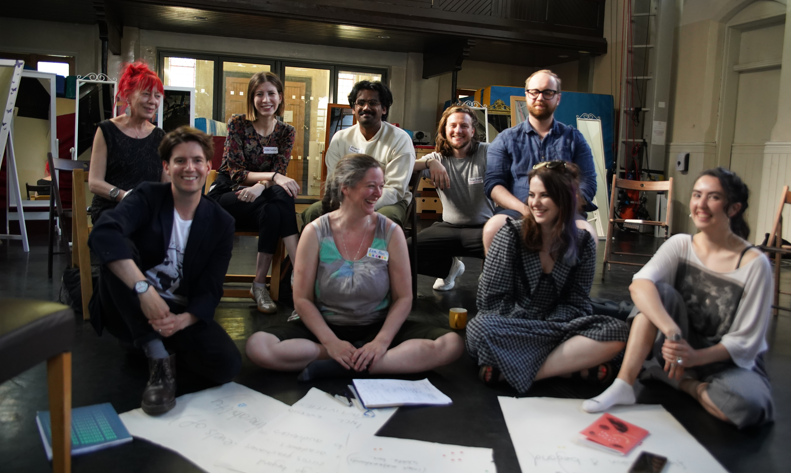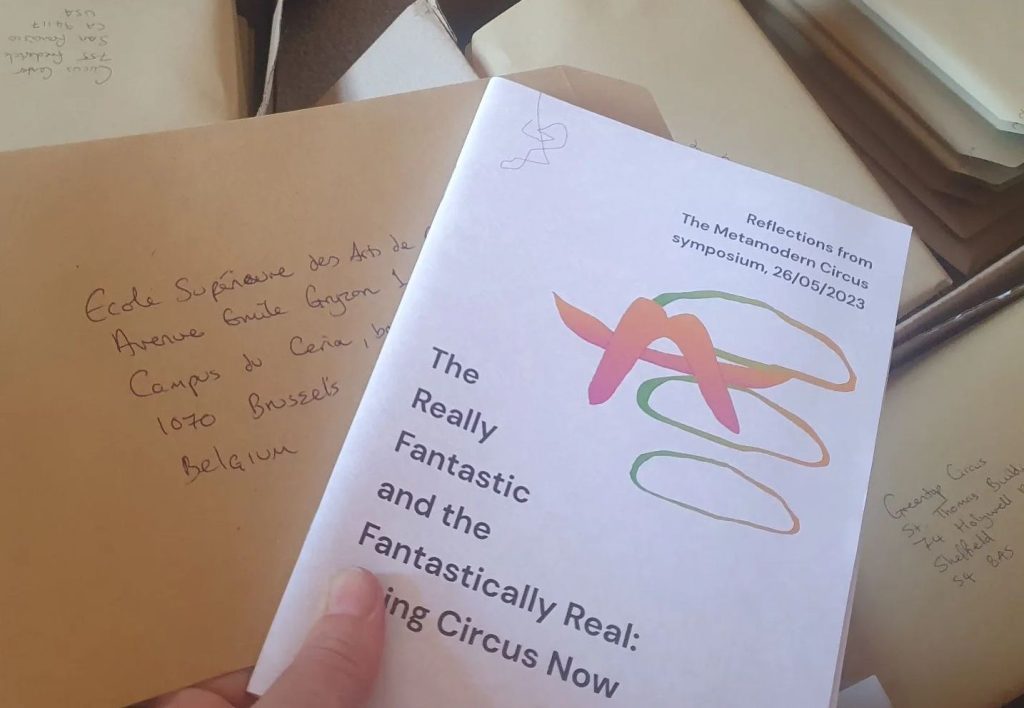Katharine Kavanagh is in the final year of her PhD in the School of English, Communication and Philosophy at Cardiff University. She is funded through the DTP’s Linguistics pathway, and researches how the different ways that UK circus audiences value their experience are represented through public texts. In this blog she describes how she successfully applied for a WGSSS Small Grant and offers four top tips to future applicants.
After a year of maternity leave, and a summer of working from home, I eagerly entered my School’s café at the start of the 2022 academic year for a PGR meet’n’greet to catch up with old colleagues and meet new ones. I’m a Linguistics student, but our school also houses departments of English Literature, Creative Writing, and Philosophy. Before too long I found myself chatting with a Philosophy student just entering his second year. Thom Hamer’s study area is metamodernism, a relatively recent movement in cultural understanding, but one that I have encountered before in my own studies of circus culture. He mentioned having run a symposium last year funded by his DTP (the AHRC SWWDTP), and the cogs in my brain started clicking…

In May 2023, we proudly produced The Metamodern Circus – the world’s first symposium dedicated to the intersections of circus practice and metamodern theory. The path to get there was long and at times stressful, but we were facilitated in our journey with funding from Thom’s DTP, the Cardiff University Doctoral Academy, and the ESRC Wales DTP (now rebranded as the Welsh Graduate School for the Social Sciences, or WGSSS).
In this blog I want to sing the praises of the WGSSS Small Project Grants funding stream, and share my experiences of applying for and managing the funds, in the hope that it will help other students to benefit from the scheme.
The fund is open to applicants twice a year, and can provide up to £1000 to successful candidates to support one of three project types as described on the WGSSS website: Cohort building, Interdisciplinarity or Collaborative.
The total budget of our symposium day was a far higher sum than can be accommodated by the Small Grants scheme, but this was largely covered by the AHRC funds Thom was able to access. In addition to the symposium day itself, however, it was important to us to properly prepare attendees in advance of the event, and then to share the findings with a wider audience of stakeholders afterwards. To do this, we wanted to distribute an introductory zine that could lay down some basics of metamodernism and circus studies to those who were unfamiliar with either or both fields, and then to produce a documentation booklet after the event that could be sent to higher education circus schools so that our knowledge could be disseminated to practitioners who were unable to attend in person.

My first big tip for readers planning an ambitious event: Combine budget pots! Figure out which bits of your project meet the brief for different funding streams, and separate out the costs accordingly into tailored applications. When we completed our WGSSS application we listed all the costs to run the full project and advised that we had also sourced some of the funds from elsewhere. At the time of application we’d had verbal confirmation from one of the other sources and were awaiting a decision on the other, so additional funds do not have to be fully confirmed in order to achieve a successful outcome for a Small Grant.
My second big tip: Make careful spreadsheets of where the money is allocated and actually spent. Even in a smaller scale project than ours, some planned expenditure will go up, and some will (hopefully!) go down. If you are accessing different funding pots, you need to know where there is room for manoeuvre between them and where there isn’t. For example, do certain expenses have to be paid by an earlier deadline than others, as in our case? One of the great benefits to us of the WGSSS scheme was that there was no requirement to complete the activity before the financial year end. Funds do however need to be used within a 12 months period and the finish date of the project should take this into account. The WGSSS office can be contacted for advice if any difficulties with anticipated timescales arise. Beyond ensuring the success of this project, the experience of budget management gained from our Small Grant has helped build skills and confidence that will support future work opportunities after graduation.
My third tip: Be prepared for your ideas to shift in line with the requirements of your funding options. Many of our best ideas came to us by seeing what constraints we had to conform to in order to secure the funding. Although it takes more work to reimagine a project based on external considerations, I think this creative adaptation helped strengthen our funding applications to ensure we were meeting all the requirements, and also helped strengthen our final offering because of the additional work that had to go into the planning. For example, we had to ensure that we were offering an activity that could benefit all ESRC funded PGRs across the DTP, and so we devised a workshop to introduce principles of collaborative writing and publication processes that would draw students from many disciplines to our niche day on circus and metamodernism. This meant we had perspectives from schools of Optometry, Engineering and Law, for example, which enriched our discussions and learning on the day. We also had to make the day available online, which taught us valuable skills in producing hybrid events. In fact, the very process of writing and honing our applications made a massive improvement to our understanding of the project and how it could be of maximum benefit to our own interests and to those of our participants and audiences. We also became experts at articulating ideas in writing that had previously only existed in spoken exchanges between us.
The application for the WGSSS funding was the simplest of the three that we wrote. The link to the form is available through the Small Grants webpage, and clarifies at the bottom where the completed form must be emailed. The first section of the form asks for standard personal details relating to your PhD programme and which funding stream you’re applying for. The second part asks for a 500-word description of the proposed activities, including timescales, how the activities will be organised and by whom, and how these will benefit you (and other students) and enhance your PhD project. The last part gives a budget table to fill out with estimates of the various costs anticipated. There isn’t room within this blog to include our final application, but if anyone would like to see a copy then get in touch and I will happily share via email.
My last tip for the application is that it requires your PhD Supervisor’s signature, so you need to factor time to discuss your idea with them into your planning, as well as to allow reasonable time before the deadline to receive their signature back on the completed form. (An e-signature is fine). At the time of writing this, the next deadline for the Small Grants funding is 15th December 2023, so if you have had ideas percolating in your brain but weren’t sure how to make them happen, then perhaps a WGSSS Small Grant could be your solution! Payments for successful project expenses are initially arranged through your own school’s finance department. The DTP will reimburse costs incurred at the end of the project once a final report and breakdown of expenditure has been submitted. Learning how to navigate University financial procedures was an unexpected and revelatory learning outcome of the project!
If you’re interested in further details of how our event ran, or would like to see a digital copy of the zine and publication that were produced, please visit TheCircusDiaries.com, an online platform that partnered with us for the event in celebration of their 10th anniversary.
And, finally, good luck to all future applicants!

